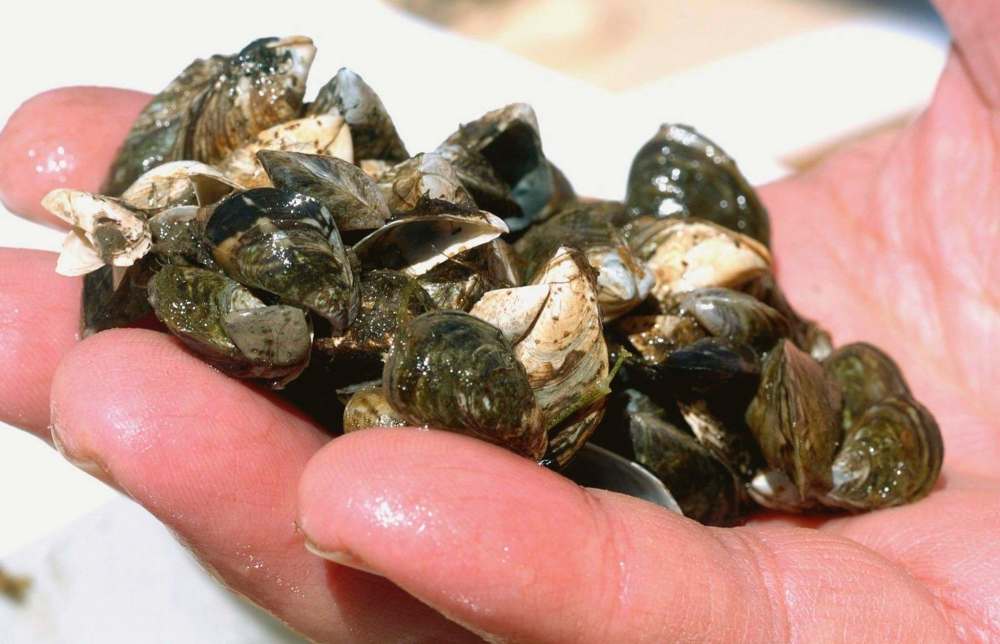Beach communities seek solution for zebra mussel dilemma
Advertisement
Read this article for free:
or
Already have an account? Log in here »
To continue reading, please subscribe:
Monthly Digital Subscription
$1 per week for 24 weeks*
- Enjoy unlimited reading on winnipegfreepress.com
- Read the E-Edition, our digital replica newspaper
- Access News Break, our award-winning app
- Play interactive puzzles
*Billed as $4.00 plus GST every four weeks. After 24 weeks, price increases to the regular rate of $19.95 plus GST every four weeks. Offer available to new and qualified returning subscribers only. Cancel any time.
Monthly Digital Subscription
$4.99/week*
- Enjoy unlimited reading on winnipegfreepress.com
- Read the E-Edition, our digital replica newspaper
- Access News Break, our award-winning app
- Play interactive puzzles
*Billed as $19.95 plus GST every four weeks. Cancel any time.
To continue reading, please subscribe:
Add Free Press access to your Brandon Sun subscription for only an additional
$1 for the first 4 weeks*
*Your next subscription payment will increase by $1.00 and you will be charged $16.99 plus GST for four weeks. After four weeks, your payment will increase to $23.99 plus GST every four weeks.
Read unlimited articles for free today:
or
Already have an account? Log in here »
Hey there, time traveller!
This article was published 29/08/2019 (2362 days ago), so information in it may no longer be current.
Manitoba beach communities are fighting back against zebra mussels but, so far, it’s a losing battle.
The Rural Municipality of Alexander (some 100 kilometres northeast of Winnipeg) is mulling its options after a pilot project beach cleanup in June showed, even with significant financial investment, the pervasiveness of the invasive species.
“Zebra mussels have completely overtaken our beaches,” said Coun. Cheryhl Corrie, who lives at Hillside Beach.

The tiny bivalves were first spotted in Lake Winnipeg in 2013, but their numbers have exploded in recent years — prompting concerns they’ll starve out fish and allow toxic blue-green algae to flourish.
“These things came on a whole lot faster than we anticipated. We knew they were in the Red River, we knew it was going to happen,” she said. “But with the immediate need… we are working on finding a solution for next year.”
Manitoba Sustainable Development rented the municipality a machine to clean the shells of dead zebra mussels from Hillside Beach, and locals ran a pilot project to test it out June 25.
“This was a one-time deal only, to see if the machine could get down there… and to see how long (the result) would last,” Corrie said.
“It was beautiful after,” RM of Alexander Reeve Jack Brisco said. “But that next day, the wind was so bad that the shells blew back on the beach, and it looked like it was — without exaggerating, I would say it was three times as bad as it was before.”
Cleaning the swath of beach came with a $7,000 price tag, and buying a similar specialized sweeper would cost at least $130,000, said Brisco.
The sweeper was pulled by a tractor that struggled on both wet and dry sand and wouldn’t be able to reach most beaches, officials said. The Alexander group only got through about 30 per cent of what it had planned to clean in seven hours.
The area looked clean, but the pilot project was far from a slam dunk.
“We want to come up with a solution, we just don’t want to be throwing money away,” Brisco said.
Meanwhile, some cottage owners have taken it upon themselves to clean beaches by hand. Every Saturday morning, people meet on nearby Lester Beach at 8:30 a.m. for an hour or so to rake up the shells.
The Lester Beach cottage owners association has provided funds for gas and other costs.
“It makes a huge difference, when we do it, I would say the beach is significantly cleaner,” said Nicole Lester.
When they started last year, they used rakes; now, they use shovels and sift out sand. The shells are moved to an unused portion of the beach.
“There’s lots of momentum, more and more people are willing to help out,” Lester said. “We’ve shown up at the beach and there’s been raked piles already left for us.”
Despite the efforts, there remain doubts. “That was working, but it was earlier in the year,” Brisco said, adding he figures the amount of shells coming ashore has doubled since then.
Disposing of the shells is also an issue. In many cases, they’re buried on the beach, but the rotting material stinks.
“It’s absolutely atrocious, it’s dead fish multiplied by 2,500,” Corrie said of the smell.
For the pilot project, the captured shells were shipped to the local dump. But that came with problems, too: it cost more, extensive permits were required, and equipment had to be thoroughly cleaned after use to avoid spreading the invasive species.
“The scene at the beach is way worse than we thought it was going to be at this time,” Brisco said. “We’ve got to do something. This is the best lake country area in Manitoba, as far as I’m concerned, and we’ve got to keep it that way.”
A spokesperson for the province said the equipment used for the pilot project is regularly used at provincial park swimming spots, including Grand Beach, Patricia Beach, Winnipeg Beach and Gull Harbour Beach on Hecla Island.
The method of cleanup doesn’t stop the spread of zebra mussels, but does help with smell and safety — the shells are sharp.
tvanderhart@freepress.mb.ca
Twitter: @tessavanderhart


